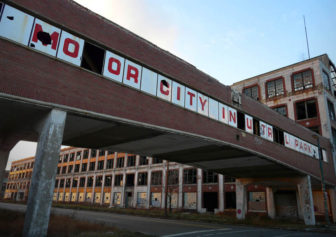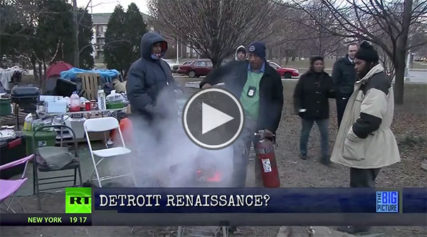Detroit’s financial picture has looked grim for a long time, but as the city tried to ward off the state from taking over its finances, Mayor Dave Bing last night offered a positive spin, saying “the picture is not all doom and gloom.”
“Every day there is more hope and possibilities,” he said in his annual State of the City address. “Like many Detroiters, I, too, am a fighter. We can’t, and won’t, give up on our city.”
As the Republican-dominated state legislature considers taking over the fiscal affairs of the Democratic-dominated city, Bing said state lawmakers in Lansing actually bear some of the blame because of cuts to revenues that should have flowed to his city.
“The total amount of cutbacks in state revenue sharing to Detroit over the past 11 years is more than $700 million. Detroit’s current general fund deficit is $327 million,” Bing said. “So, it is clear that if Detroit had received its agreed upon share of revenues from the state, our financial picture would not be as grim today.”
The specter of takeover is real. Michigan Governor Rick Snyder has appointed a team to examine Detroit’s finances and determine if it needs a state-appointed manager. One of the options would be for the manager to consider bankruptcy for the city, which would be a disaster in many ways, not the least of which is the city’s perception to outsiders. It would make Detroit the largest Chapter 9 municipality bankruptcy in U.S. history, by far.
One of the biggest problems of the Motor City has been the severe decline in its population, which has drastically shrunk its tax base. While Detroit was once the nation’s fourth-largest city from 1920 to 1950, when the population peaked at 2 million, led by the auto industry, the city is now the nation’s 18th largest with 706,000 residents — losing an unheard-of 25 percent of its population in just the last decade.
The city’s near-impossible task is to balance the cost of its services with its shrinking revenue. In 2011, it long-term debt was estimated at more than $12 billion by state officials.
Bing, a former basketball star with the Detroit Pistons, said he has made difficult and unpopular decisions, including job cuts and the privatization of some city services.
“Beginning tonight, it is time to change the conversation about Detroit. It is time to focus on the many positive changes taking place,” he said.
Bing’s statement about slashing city jobs exemplifies a problem the black community is facing across the country. While the private sector has steadily been adding jobs during the Obama administration, black workers are disproportionately found in the public sector. So as states and cities continue to slash jobs, the black unemployment rate doesn’t budge or even goes up while the unemployment rate for whites continues to steadily fall.
“Despite the naysayers’ predictions, there have not been any payless paydays. No emergency manager to date,” Bing said, drawing some uneasy laughter from the crowd.
After the speech, City Council President Charles Pugh told reporters he wished Bing had more strongly stated his opposition to the idea of emergency management.
“I think he should’ve been very clear that we don’t need it,” Pugh said. “And that there’s a way forward without somebody else coming in to run the city.”


